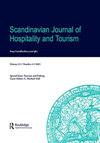WWOOFers in Norway – who are they?
IF 3.6
4区 管理学
Q2 HOSPITALITY, LEISURE, SPORT & TOURISM
Scandinavian Journal of Hospitality and Tourism
Pub Date : 2020-06-01
DOI:10.1080/15022250.2020.1766559
引用次数: 3
Abstract
ABSTRACT Some travellers “want to make a difference” and develop themselves while exploring the world through programmes offered by international volunteer organisations, such as the WWOOF initiative (WorldWide Opportunities on Organic Farms). This international network promotes organic farming and sustainable lifestyles by connecting hosts and volunteers who are willing to work for hosts in exchange for food, accommodation, and insight into organic farming. However, who are these WWOOFers? While researched mainly by qualitative studies in other countries (e.g. Australia, Hawaii, Japan, U.S.A.), this is the first cross-sectional study of WWOOFers in Europe. Data was collected by online questionnaires to WWOOFers registered at WWOOF Norway (n = 1184; response rate = 85%). These WWOOFers come from 77 countries, among which U.S.A., Germany, France, Italy, Spain, and the Netherlands dominates. They are mainly young, well-educated, well-travelled, urban people wanting to explore rural living. Some, but not all report lifestyles and behavioural intentions in line with the WWOOF philosophy. Age and gender differences apply. Through factor analyses, the study identified seven personal characteristics, including, in descending order Empathy, Goal-orientation, Outgoing, Reserved, Recognition seeking, Child-oriented, and Egoistic-materialistic. The study expands the current insights and partly contradicting previous research.挪威的WWOOFers——他们是谁?
摘要:一些旅行者“想有所作为”,在探索世界的同时发展自己,通过国际志愿者组织提供的项目,如WWOOF倡议(有机农场的全球机遇)。这个国际网络通过连接愿意为主人工作的主人和志愿者,以换取食物、住宿和对有机农业的了解,促进有机农业和可持续生活方式。然而,这些WWOOFers是谁?虽然主要通过其他国家(如澳大利亚、夏威夷、日本、美国)的定性研究进行研究,但这是欧洲首次对WWOOFers进行横断面研究。数据是通过对在挪威WWOOF注册的WWOOFers(n = 1184;响应率 = 85%)。这些WWOOFers来自77个国家,其中美国、德国、法国、意大利、西班牙和荷兰占主导地位。他们主要是年轻、受过良好教育、旅行频繁、希望探索乡村生活的城市人。一些人(但不是所有人)报告了符合WWOOF哲学的生活方式和行为意图。年龄和性别差异适用。通过因素分析,本研究确定了七种个人特征,按降序依次为移情、目标导向、外向、矜持、寻求认可、儿童导向和利己主义唯物主义。这项研究扩展了目前的见解,部分与之前的研究相矛盾。
本文章由计算机程序翻译,如有差异,请以英文原文为准。
求助全文
约1分钟内获得全文
求助全文
来源期刊
CiteScore
7.90
自引率
8.30%
发文量
14
期刊介绍:
Scandinavian Journal of Hospitality and Tourism is the leading Nordic journal for hospitality and tourism research. SJHT aims at initiating and stimulating high-impact and innovative research relevant for academics and practitioners within the hospitality and tourism industries. The journal takes an interdisciplinary approach including, but not limited to geography, psychology, sociology, history, anthropology, and economics. SJHT encourages research based on a variety of methods, including both qualitative and quantitative approaches. The journal covers all types of articles relevant to the Nordic region, as well as the North Atlantic, North Sea and Baltic regions. We also welcome reviews and conceptual articles with a broader geographical scope that clearly enhance the theoretical development of the hospitality and tourism field. In addition to research articles, we welcome research notes and book reviews. Published articles are the result of anonymous reviews by at least two referees chosen by the editors for their specialist knowledge.

 求助内容:
求助内容: 应助结果提醒方式:
应助结果提醒方式:


